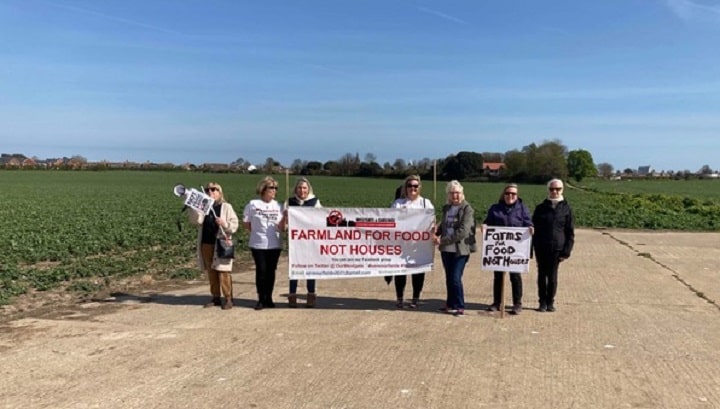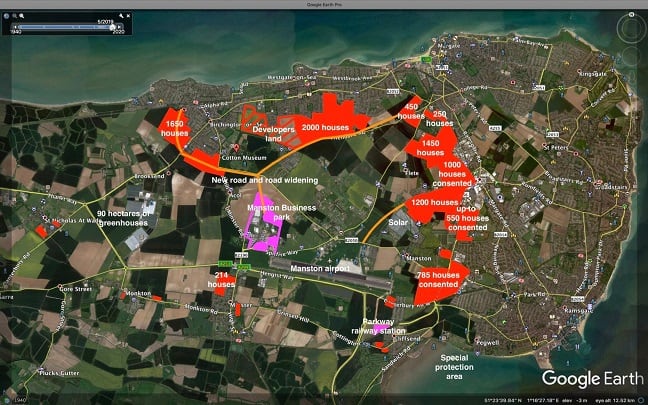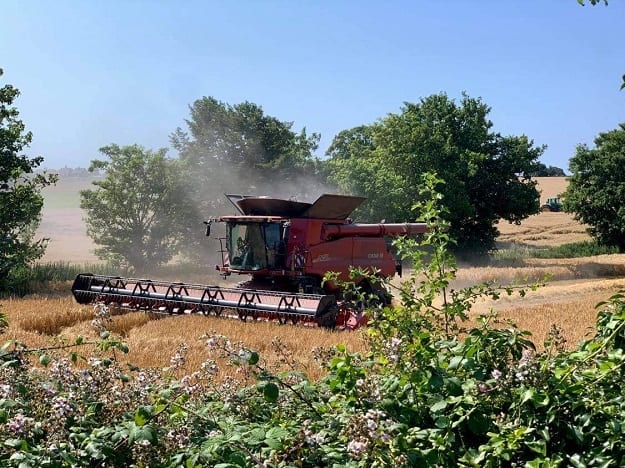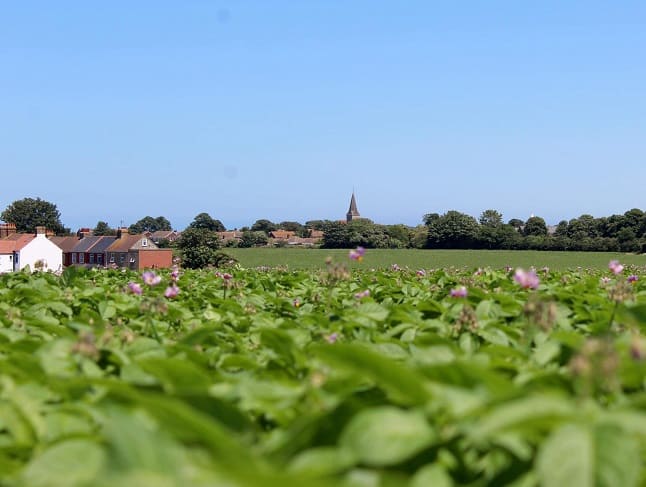
Members of Westgate & Garlinge Action Group Against Housing Development on Farmland have written to the government’s Secretary of State for Housing to ask why amendments to the planning system do not include protection of agricultural land.
The action group, which has just marked its second anniversary, was formed to campaign against a 2,000 home development proposed for Westgate and Garlinge.
The housing scheme by Millwood designer Homes proposes up to 2000 homes, including up to 100 Extra Care units, a care home, two form entry primary school, health centre and shops, cafes and restaurants on 237 acres which includes agricultural land.
The action group is fighting “the decimation of prime agricultural land,” for development at this site and others across the isle.
Changes to planning
Earlier this month the government added measures alongside the Levelling Up and Regeneration Bill following a rebellion by some 60 MPs who backed a plan to ban mandatory housing targets in England,
Mr Gove announced measures to give local councils greater control over housebuilding in their areas. These include looking at local housing needs rather than mandatory nationally set targets, making it easier to develop brownfield rather than green spaces and introducing a registration scheme for short-term lets.
New guidance sets out that local authorities are not required to review Green Belt to deliver homes. Brownfield land will be prioritised for development, with the government launching a review into how such sites are used.

But the action group says there is no specific mention of agricultural land even though there is marked difference between countryside greenbelt and land used to produce food.
In a letter to Mr Gove the group says that it supports the bill amendments on making housing targets advisory but protections for agricultural land need to be included.
The letter says: “The housing numbers are based on a faulty algorithm from 2014. So housing targets should be removed and local authorities should be able to assess housing needs in their own area.
“Currently all over the country but especially in the South East excess houses are being built in areas that don’t need them and London boroughs are buying them up and moving people away from their communities.
“We welcome the recent announcements from your department that there will be more flexibility to reflect local circumstances in housing targets. Giving local authorities power to promote brownfield development and a wider review to promote brownfield development is a good first step.
“But experience shows that developers will always choose to build on agricultural land instead of brownfield as it is far easier and more profitable for them.
“There needs to be protection of the best and most versatile prime agricultural land in the amendments, with tough penalties for developers who choose to develop it when there is brownfield available included.

“We are furious that the government doesn’t seem to know the difference between farmland that is vital for food security and countryside. We were dismayed to see that agricultural land was not mentioned separately in the document outlining proposed amendments to the Levelling up and Regeneration bill from your department.
“It is different to green belt and green fields providing food and acting as a carbon sink.
“(The) land in question in Westgate & Garlinge is best and most versatile grade 1 land, which produces wheat to bake two million loaves of bread a year, amongst other crops such as potatoes and corn.
“The around 200 acres of farmland in Westgate also stores around 1,980 tonnes of carbon a year. This is a Thanet wide issue and is also happening across the whole country.”
The letter adds: “There is already so much agricultural land across Thanet being built on. We cannot afford to lose any more. Thanet is at risk of becoming one great urban sprawl. Consideration should be given of brownfield sites and empty houses and commercial buildings before any more farmland is built on.”

The letter also raises issues of insufficient infrastructure -schools, GPs, roads, traffic- the area’s water stress and flooding issues and the effects of climate change.
Local Plan
The action group say current Local Plans – an area’s blueprint for housing, business and infrastructure – should be scrapped with new plans created using data that reflects local need more accurately.
The Thanet local plan has housing need calculated using the Government’s “standard method” resulting in a figure of 21,700 dwellings by 2040. The local plan up to 2031 – with 17,140 homes required – was adopted in July 2020 but at the end of last year a review began to extend the plan to 2040.
Thanet council is currently considering around 200 sites on the isle that have been put forward as potential areas for development or open spaces following a ‘Call for Sites’ last year,
Housing need based on population projections instead of the standard method could reduce the housing target.
The action group has invited Mr Gove to come and visit Thanet to seethe impact of development and lost farmland on the isle.
They have also written to Thanet council leader Ash Ashbee to ask that “best and most versatile prime productive agricultural land that has not been yet been given planning permission such as the farmland in Westgate & Garlinge (be removed) from the local plan and replace it with brownfield sites and empty properties. In line with the government’s ambitions of brownfield first.”
They ask that this includes the site earmarked for 2000 homes in Westgate and Garlinge and another proposed for 1,600 homes in Birchington, adding: “The whole character of Thanet would be irreversibly altered for the worse with the loss of so much farmland.”


Good work. Keep at it.
Stop the need for house building by stopping the need for houses.
Improve your own country.
Stay in your lane.
I think you’ll have difficulty telling people not to have babies.
It might be worth noting that Mr Gove was recently in receipt of at least £100,000 from a property developer.
Even in these “woke” times, around half the population are still unable to have a baby!
‘Even in these ”woke”times around half the population are still unable to have a baby’.Please explain ‘woke’ and what it has to do to fecundity? I am genuinely mystified as to what this has to do with house building and where you get a figure of 50% of the population being unable to have a baby.I suppose nearly 50% of the population are male and biologically cannot have children.But where does ‘woke’ come in?
Now addressing the problem of housing.
Thanet has larger area of continuous urban terrain than most Kent Districts, and town planning policy in thanet is poor.A policy of never ending urban sprawl has created consequences, one of which is groups of outraged locals fighting guerilla warfare with council planners and developers.
The poor standards of building design, construction, and planning, has created acres of dreary, poor quality housing, heavily reliant on car use, and badly connected to places of work, entertainment and retail centres.
The people depicted aren’t farmers,the farmers are busy buying and selling land for development. They are people who own houses in the vicinity and don’t want more houses near them.But think on.Did the people who lived in Garlinge and Westgate when the existing houses were built, complain? You bet they did! That’s what people do, they see new developments as a threat to their life style and well being.
Poorly designed, ‘cookie cutter’ housing of a generic nature is not popular, but that is what is served up by the industry. What’s more speculative building can take a decade or more to complete, and in the meantime, local residents have to put with noise, dust, builders vans parked everywhere and general disruption.
Top down housing targets don’t work,but neither does laissez faire, or hoping like Mikawber, that ‘something will turn up’.
There is a housing crisis, but Redrow, Persimmon,Barratt and Taylor Wimpey are not the answer.They are the problem.
Marvellous and accurate response!
Nice piece except it is the landowners who are offering up the agricultural land such as St Johns College Cambridge and Church Commissioners – there may be some farmer owner occupiers but most are tenants.
As for ‘noise, dust, builders vans’ etc seems our ‘experts’ in planning at TDC see this as a transient issues hardly worth considering.
sadly i dont think these people will ever beat greed and corruption , although i wish them the very best of luck
I wish them the best of luck in their efforts Thanet we need green spaces we have no infrastructure for all these houses
Good Luck and Happy Christmas!